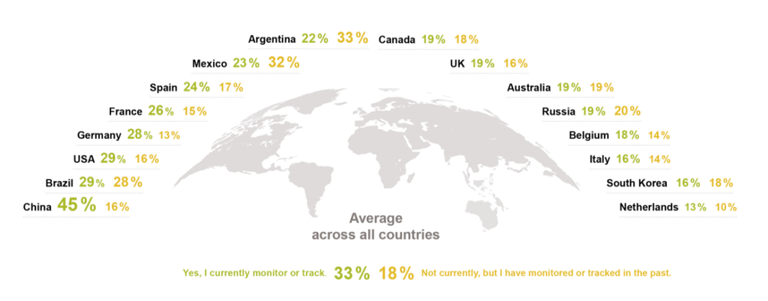I’m trying to keep up a thread of posts on self-tracking and the ‘quantified-self’. Basically, I’m a bit obsessed with self-tracking, and so digging into the sociology of it is a bit of a hobby of mine.
This post is simply an overview on the findings of the most representative relatively recent global survey I could find on health and fitness tracking. Also a few thoughts on the validity of said survey and why there is so much global variation.
The Survey I’m summarising was carried out by GFK (1). It was an online survey of over 20 000 people in 16 countries.
The survey asked two very simply questions:
- Do you track your health or fitness*?
- Why*?
Global Trends in Health and Fitness Tracking: The Main Findings
And a few musings on how me might explain these variations. NB the report is merely statistical, there is no analysis, so what’s below are my own thoughts on the matter…..
Globally 33% of the world’s population track their health or fitness

China tops the league tables with 45%, the USA is in at 29% tracking, compared to only 19% in the UK and a mere 13% in the Netherlands.
Possible explanations for these trends?
Is it possible that the high levels of self-tracking in China are due to the surveillance state? Maybe it’s something the government requires people to do for various reasons? Ironically, the same might apply to the USA… tracking might be because of health-insurance reasons, so Corporate inducement rather than state inducement (same thing?!?)
It’s possible that the Latin American tracking is due to the younger age profiles of the populations compared to Europe, but then again Germany’s ‘up there’ and that’s well known as having an ageing population.
In terms of the European variation, I’ve no idea> I’d expect to see Germany and France over with Britain and the Netherlands, for example!
There is a certain level of mystery to this…!
Variation by age
The groups most likely to track are clearly people in their 20s and 30s, with the numbers gradually decreasing with age. Also, quite low tracking for the under 20s.

Given that the main reasons for tracking are fitness (rather than illness) related, this makes sense: 20s and 30s are when you are your most active, and your stats are trending upwards. I guess the under 20s are too ‘free’ for tracking, or just can’t be bothered.
The main reasons for self-tracking
The respondents could tick as many of the boxes below as they wanted…

Clearly the main reasons are health, fitness, well-being, which is no surprise. Rather than more specific goals such as ‘monitoring a health condition’ or training for a specific race. So it would seem that fully one third (or nearer one quarter) of the world’s population are keeping a ‘mild eye’ on their health, mostly without government inducement.
It’s interesting to note that only around 20% say they do it ‘for fun’ suggesting that people track their health because it’s something they feel they should do, maybe, a chore, rather than a pleasure.
On the validity of the survey….
I’m going to go ahead and say that the survey yields highly valid data, as far as it goes: because the questions and their responses are so clear and simple there’s no room for misunderstanding.
Final thoughts
So that’s > 1 billion people (conservative estimate of 1/rd of the adult population) who self-track globally. That really is ‘Big Data’, and most of them ‘compelled’ to do it, rather than enjoying it. That really does suggest something quite dark about this type of self-tracking…
Nb - There was no significant variation by gender in terms of self-tracking, the report doesn’t show whether there is variation by gender or age in terms of what the reasons for tracking were.
Sources
Global Health Survey by GFK and the source of the pics - https://www.gfk.com/global-studies/global-studies-fitness-tracking/
NB – you have to enter your email to get the download. YES, it’s an evil exercise in data harvesting. Still, I guess it goes with tracking-territory!
Appendix One: more detail on the two survey questions:
Q1: Do you currently monitor or track your health or fitness using an online or mobile application or through a fitness band, clip, or smartwatch? This could range from monitoring your diet, weight, or health concerns to tracking your steps or other exercise.
There were four possible responses
- Yes, I currently monitor or track
- Not currently, but I have monitored or tracked in the past
- No, I have never monitored or tracked my health or fitness
- Not sure
This included a dozen responses which respondents could choose from, such as:
- To motivate myself to exercise
- To lose weight
- To be more productive
- Because it’s fun
- And so on….
Posted from my blog with SteemPress : http://revisesociology.co.uk/global-trends-in-fitness-tracking/
What's the key for the little pie charts?
Oh soz I'll add that in later. Basically 20-40 is the biggest usage!
Posted using Partiko Android
So magnificent and alluring =)
But not fun 🙊🙈🙉
Hi @revisesociology!
Your UA account score is currently 4.091 which ranks you at #3250 across all Steem accounts.
Your rank has improved 10 places in the last three days (old rank 3260).Your post was upvoted by @steem-ua, new Steem dApp, using UserAuthority for algorithmic post curation!
In our last Algorithmic Curation Round, consisting of 275 contributions, your post is ranked at #184.
Evaluation of your UA score:
Feel free to join our @steem-ua Discord server